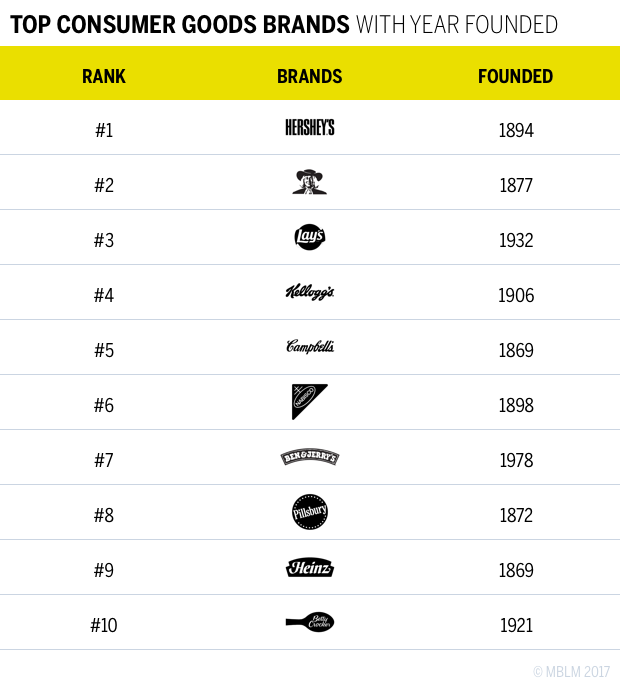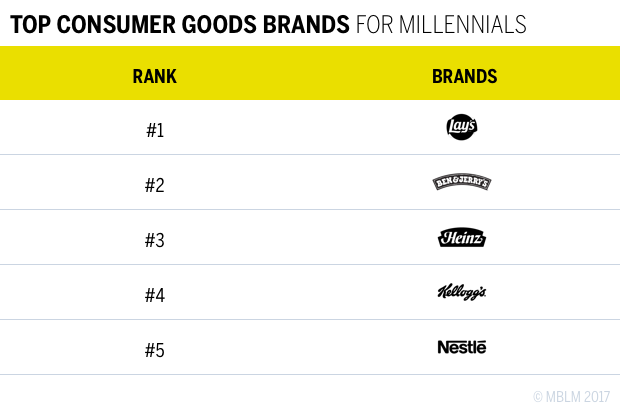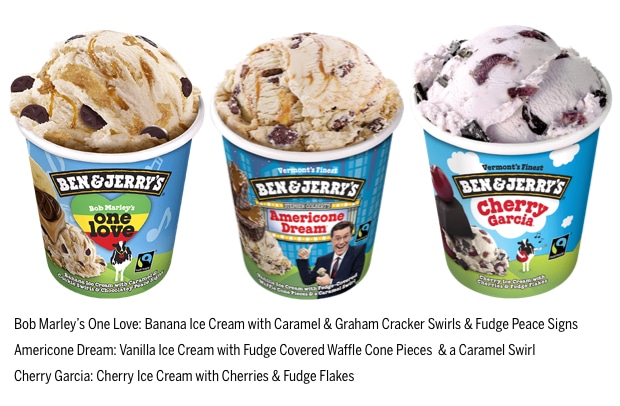In our 2017 Brand Intimacy Study, there are a few brands that swim against the current. These brands have successfully built intimacy in well-established industries that are home to more established brands. Amazon leads its industry, outperforming older, more traditional retail brands, and Netflix is second only to Disney in the media & entertainment industry. Through disruptive technology, these brands have challenged their categories and become dominant in only a few decades, but these internet pioneers are not the only fierce up-and-comers to challenge the status quo.

Ben & Jerry’s has been the rising star of consumer goods, with the seventh highest Brand Intimacy Quotient score in the industry despite its relative youth as a brand. Founded in 1978, Ben & Jerry’s is our youngest consumer goods brand by 46 years, and it is well below the average age of the industry’s Top 10 (114 years). Beginning with only $12,000 in start-up money, Ben & Jerry’s products could be found across the North- and Southeast by 1985, with locations in New York, New Jersey, Pennsylvania, Florida, and Georgia.1 Today, the company has a global presence, with over 5,800 eating locations and $132 million in annual sales revenue.2 Over the years, Ben & Jerry’s has maintained broad appeal, which is evidenced by its above-average rates of consumers in the sharing stage of Brand Intimacy. The stages of Brand Intimacy measure the depth and degree of intimate brand relationships. These relationships go from sharing to bonding to fusing.
Established category brands like Hershey’s, Quaker, Kellogg’s, Campbell’s, Nabisco, Pillsbury, and Heinz are over 100 years old and promote a wholesome, old-fashioned image. This is why it is no surprise that of the six Brand Intimacy archetypes (patterns or markers that identify the character and nature of brand relationships), nostalgia, which focuses on memories of the past and the warm, poignant feelings associated with them, is the one most associated with consumer goods. For Ben & Jerry’s, indulgence is the archetype it is most linked with, but it is possible that as the brand gets older, it will strengthen its association with the nostalgia archetype, as brands in this category typically do. So far, the brand has succeeded in finding ways to distinguish itself in a category that has been dominated by established players, making it an exemplar for building Brand Intimacy.
How Ben & Jerry’s Does It
In more ways than one, Ben & Jerry’s goes against the grain of the consumer goods industry. The brand is defined by the way it breaks the mold, first and foremost in its mission to pursue the sustainable corporate concept of “linked prosperity,” but also in the ways it markets its products, sources its ingredients, and participates in sociopolitical conversations. Although legacy brands might feel conventionally wholesome, Ben & Jerry’s feels unconventionally honest, passionate, and human. This sets the brand apart in the industry and makes it easy for consumers to form genuine connections. Here is how Ben & Jerry’s does it:
Ethical Edibles
For some, ice cream might be the last thing they would associate with responsibility, but for Ben & Jerry’s, it is a key priority. The brand’s ice cream is made with fair trade ingredients, including eggs from certified humane cage-free farms, and all its products (with the exception of ice cream bars) are entirely non-GMO. Its Caring Dairy program encourages dairy farmers to raise “happy cows” by improving the quality of animal care and practicing more sustainable farming. Additionally, the brownies for the Half-Baked™ and chocolate fudge brownie flavors are sourced from Greyston Bakery, an organization committed to providing job training and jobs for those facing barriers to employment.3 This multifaceted commitment to ethical sourcing and sustainability connects to Ben & Jerry’s mission of promoting linked prosperity. Although the brand is ranked #2 in its industry and #4 overall for the Brand Intimacy archetype of indulgence (centered on moments of pampering and gratification), it sets itself apart from other indulgent food brands by providing a globally responsible way for consumers to treat themselves. This makes people feel positive about supporting the brand, providing the closest thing to a guilt-free experience with ice cream.
An Unlikely Voice For Progressive Politics
For Ben & Jerry’s, responsibility goes beyond how the ice cream is made. The brand is also known for its bold, progressive political stances. Ben & Jerry’s has supported marriage equality by naming ice cream flavors “I Dough, I Dough,” “EngageMint Party,” and “Hubby Hubby,” and by banning same-flavored scoops in Australia until marriage equality is achieved.4 It has supported democracy with the “Empower Mint” flavor and the “Get the Dough Out of Politics” campaign, which aims to eliminate corporate influence from the democratic process. Other issues they openly support include racial justice, GMO labeling, and climate justice.5 Although not everyone agrees with Ben & Jerry’s stances, it is rare that a brand is so passionate and open about the causes it supports, especially in an industry dominated by more traditional brands.
Giving New Meaning To “Ice Cream Social”
For its relative size, Ben & Jerry’s is amazingly effective on social media. According to NetBase’s Social Media Industry Report 2016: Restaurant Brands, it had more social media mentions per sales dollars than any other restaurant brand with 5,627, which is 66 percent more than that of the second-place brand, Chipotle.6 Ben & Jerry’s owes part of its success on social media to its ability to leverage its involvement in the various causes mentioned earlier, but its social posts also highlight enticing photos of its products and promote events like Free Cone Day, which resulted in its biggest social spike of 2016. This rare combination of social consciousness and food fetishization has made them a force to be reckoned with on social media, especially among millennials, who have a strong connection with Ben & Jerry’s, ranking it as their #2 most intimate consumer goods brand.

Bringing Fandom And Flavor Together
One way Ben & Jerry’s has been able to grow its audience is by tapping into existing ones. The brand is known for its pop-culture-themed flavors that reference iconic figures like “Cherry Garcia” (Jerry Garcia), “Phish Food,” “Americone Dream” (Stephen Colbert), “The Tonight Dough” (Jimmy Fallon), and recently, “Bob Marley’s One Love.” In addition to inspiring some excellent puns, these flavors invite members of specific entertainment fandoms to get to know Ben & Jerry’s ice cream. In other words, it capitalizes on the intimate bonds that consumers have already formed with other brands by creating new connections to the Ben & Jerry’s brand.

The Challenger Mind-Set
What a lot of these characteristics boil down to is that Ben & Jerry’s, in many ways, embodies a challenger mind-set in its industry. By challenging well-established brands and food industry conventions, the brand has boldly distinguished itself in just a few decades. This strategy has worked so well for Ben & Jerry’s because it feels completely authentic. From the beginning, the brand has been the underdog that stands up for what it believes in and commits 100 percent to elevating its products and its industry for the better.
Conclusion
Brands like Ben & Jerry’s, Netflix, Amazon, Red Bull, Chipotle, and Southwest Airlines have proven that it is possible for younger brands to take on the giants of an industry and cultivate highly intimate consumer bonds. They often do this by challenging the status quo, whether it is by offering completely new products and services or simply by embodying a unique philosophy. Although Ben & Jerry’s is known for its delicious ice cream, the brand is beloved for its personality, ethos, and mission. As legacy consumer goods brands strive to appear traditional and comfortable, Ben & Jerry’s thrives on being different, creating lasting emotional connections with consumers by being itself. The brand is what its 100-year-old contemporaries could never be: outspoken and unconventional.
To download the full Brand Intimacy 2017 Report or explore the Ranking Tool, please visit: mblm.com/brandintimacy/.
Read our detailed methodology here and review the sources cited in this article here.
To learn more about MBLM, click here.
